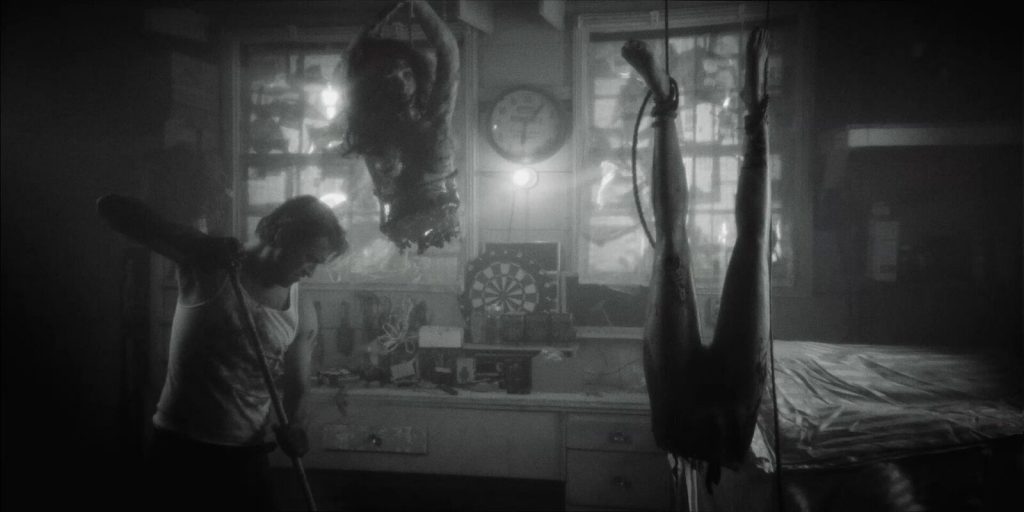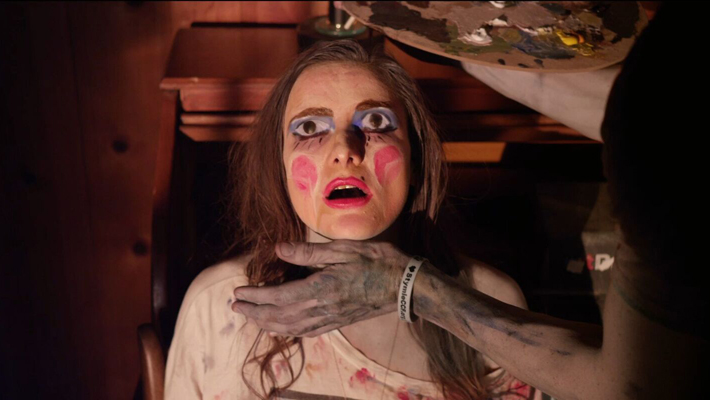I have a suspicion that the highest praise I could afford to the maker of Tabloid Vivant is the concession of the absurd amount of time I have dedicated to cobbling an opening sentence for this review. I offer it up willingly to a strange little film with more ambition than execution. Because really, where to start? Any one component would be arbitrary, so let’s go with what is intuitive; a general plot breakdown.
Tabloid Vivant is, at its core, the awkwardly paced story of an artist named Klinkau going into the woods with art critic and casual hook-up, Sara, to work on an innovative new form of art. For reasons that are nebulous at best, the process begins to take a physical and mental toll on both.
I know, this is the barest possible bones of a summary, but there is actually not a great deal of plot at play here. Long stretches are dedicated to diatribes about art and philosophy which are, no doubt, well-founded and educated, but not particularly riveting to watch. Nor do they contribute much to explaining to a layman why Klinkau’s work is so revolutionary or important (an art school graduate would probably devour it). There are also periodic references to the Black Dahlia murder, which in no way pay-off or really tie-in, other than to add an underlying sense of the macabre (which, to its credit, is successful, if inconsistent).

There are long takes of almost static shots; they carry the sense of import without delivering much of an effect. The movie does, however, occasionally summon some very chilling images. Klinkau, attempting to paint Sara and finding her color too wan, paints her face like a deranged kewpie doll, and it is legitimate nightmare fuel. It is effective enough that it almost cancels out the fact that Sara is introduced wearing make-up, which is, in fact, just paint for the face and a much easier solution.

The movie is mostly a two-hander between Sara and Klinkau. Tamzin Brown is relatively charming and as likable as either character manages to be as Sara (at one point, she enters a scene walking down a street and reading a book aloud to herself, which nobody does, ever. Brown makes it as naturalistic as such an obviously contrived action can possibly be.) There is a sense that is prevalent through a lot of genre film-making of “bitches be crazy”-that this allegedly accomplished, intelligent woman is mostly a narcissistic complaint machine; a sort of Wendy viewed exclusively through a cabin-fever riddled Jack’s eyes in “The Shining”. At a certain point, Klinkau is flinging verbal abuse at her and telling her how unimportant her work is and…she stays. There is nothing to suggest these two people have a long history together (I believe they say six months) or a deep, emotional connection that would make her feel as if this is out of character (though even then, wouldn’t you seek help? Or intervene?), and there is no practical reason I can conceive of that she would stay. She’s not snowed in. No one’s tampered with her brakes. She is pitching an article about him and his process, sure, but she could change the pitch.
Klinkau himself is one of the biggest narrative problems-exceedingly unlikable, wildly unsympathetic- and I almost don’t care, because he is played by Jesse Woodrow with a subtlety usually reserved for horny wolves in Tex Avery cartoons. It is genuinely bizarre. Initially, it is very jarring; almost every movement is huge, as if the director has wired Woodrow with a shock collar and delivers medium voltage electrocutions throughout. The longer it goes on, the bigger and more insane it becomes. I don’t know if it constitutes a good performance, but it is extremely compelling.
The best argument in favor of Tabloid Vivant is its direction. There are flashes of brilliance throughout-well executed cuts that often add a sense of levity that is sorely needed. There is also a genuinely terrible bit of green screen in the beginning that-intentional or not-adds a strange stylistic flair that seems to tip its hat to the more noir elements that occasionally try to surface.
In its purest form, Tabloid Vivant is a movie about art. Art about art is always elusive, a difficult thing to make dynamic. There are enough bursts of the truly weird and occasionally inspired to make it worth a watch, if one is well equipped with a box of wine and elastic patience.
